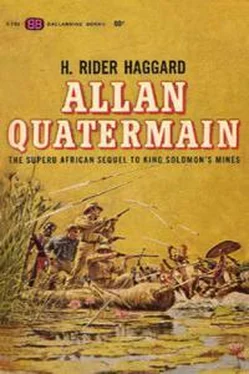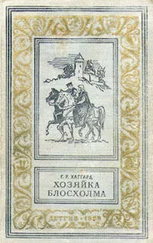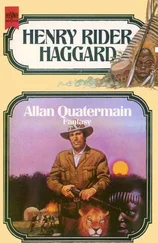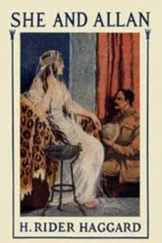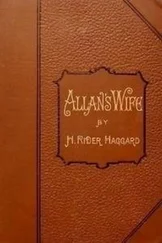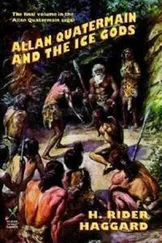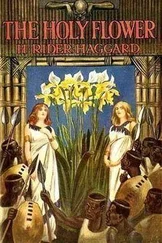'Seest thou me?'
'Ay, fellow, I see thee.'
'And seest thou this?' and he held Inkosi–kaas before his eyes.
'Ay, fellow, I see the toy; what of it?'
'Thou Masai dog, thou boasting windbag, thou capturer of little girls, with this "toy" will I hew thee limb from limb. Well for thee that thou art a herald, or even now would I strew thy members about the grass.'
The Masai shook his great spear and laughed loud and long as he answered, 'I would that thou stoodst against me man to man, and we would see,' and again he turned to go still laughing.
'Thou shalt stand against me man to man, be not afraid,' replied Umslopogaas, still in the same ominous voice. 'Thou shalt stand face to face with Umslopogaas, of the blood of Chaka, of the people of the Amazulu, a captain in the regiment of the Nkomabakosi, as many have done before, and bow thyself to Inkosi–kaas, as many have done before. Ay, laugh on, laugh on! tomorrow night shall the jackals laugh as they crunch thy ribs.'
When the Lygonani had gone, one of us thought of opening the basket he had brought as a proof that Flossie was really their prisoner. On lifting the lid it was found to contain a most lovely specimen of both bulb and flower of the Goya lily, which I have already described, in full bloom and quite uninjured, and what was more a note in Flossie's childish hand written in pencil upon a greasy piece of paper that had been used to wrap up some food in:—
'Dearest Father and Mother,' ran the note, 'The Masai caught us when we were coming home with the lily. I tried to escape but could not. They killed Tom: the other man ran away. They have not hurt nurse and me, but say that they mean to exchange us against one of Mr Quatermain's party. I will have nothing of the sort . Do not let anybody give his life for me. Try and attack them at night; they are going to feast on three bullocks they have stolen and killed. I have my pistol, and if no help comes by dawn I will shoot myself. They shall not kill me. If so, remember me always, dearest father and mother. I am very frightened, but I trust in God. I dare not write any more as they are beginning to notice. Goodbye.—Flossie.'
Scrawled across the outside of this was 'Love to Mr Quatermain. They are going to take the basket, so he will get the lily.'
When I read those words, written by that brave little girl in an hour of danger sufficiently near and horrible to have turned the brain of a strong man, I own I wept, and once more in my heart I vowed that she should not die while my life could be given to save her.
Then eagerly, quickly, almost fiercely, we fell to discussing the situation. Again I said that I would go, and again Mackenzie negatived it, and Curtis and Good, like the true men that they are, vowed that, if I did, they would go with me, and die back to back with me.
'It is,' I said at last, 'absolutely necessary that an effort of some sort should be made before the morning.'
'Then let us attack them with what force we can muster, and take our chance,' said Sir Henry.
'Ay, ay,' growled Umslopogaas, in Zulu; 'spoken like a man, Incubu. What is there to be afraid of? Two hundred and fifty Masai, forsooth! How many are we? The chief there [Mr Mackenzie] has twenty men, and thou, Macumazahn, hast five men, and there are also five white men—that is, thirty men in all—enough, enough. Listen now, Macumazahn, thou who art very clever and old in war. What says the maid? These men eat and make merry; let it be their funeral feast. What said the dog whom I hope to hew down at daybreak? That he feared no attack because we were so few. Knowest thou the old kraal where the men have camped? I saw it this morning; it is thus:' and he drew an oval on the floor; 'here is the big entrance, filled up with thorn bushes, and opening on to a steep rise. Why, Incubu, thou and I with axes will hold it against an hundred men striving to break out! Look, now; thus shall the battle go. Just as the light begins to glint upon the oxen's horns—not before, or it will be too dark, and not later, or they will be awakening and perceive us—let Bougwan creep round with ten men to the top end of the kraal, where the narrow entrance is. Let them silently slay the sentry there so that he makes no sound, and stand ready. Then, Incubu, let thee and me and one of the Askari—the one with the broad chest—he is a brave man—creep to the wide entrance that is filled with thorn bushes, and there also slay the sentry, and armed with battleaxes take our stand also one on each side of the pathway, and one a few paces beyond to deal with such as pass the twain at the gate. It is there that the rush will come. That will leave sixteen men. Let these men be divided into two parties, with one of which shalt thou go, Macumazahn, and with one the "praying man" [Mr Mackenzie], and, all armed with rifles, let them make their way one to the right side of the kraal and one to the left; and when thou, Macumazahn, lowest like an ox, all shall open fire with the guns upon the sleeping men, being very careful not to hit the little maid. Then shall Bougwan at the far end and his ten men raise the war–cry, and, springing over the wall, put the Masai there to the sword. And it shall happen that, being yet heavy with food and sleep, and bewildered by the firing of the guns, the falling of men, and the spears of Bougwan, the soldiers shall rise and rush like wild game towards the thorn–stopped entrance, and there the bullets from either side shall plough through them, and there shall Incubu and the Askari and I wait for those who break across. Such is my plan, Macumazahn; if thou hast a better, name it.'
When he had done, I explained to the others such portions of his scheme as they had failed to understand, and they all joined with me in expressing the greatest admiration of the acute and skilful programme devised by the old Zulu, who was indeed, in his own savage fashion, the finest general I ever knew. After some discussion we determined to accept the scheme, as it stood, it being the only one possible under the circumstances, and giving the best chance of success that such a forlorn hope would admit of—which, however, considering the enormous odds and the character of our foe, was not very great.
'Ah, old lion!' I said to Umslopogaas, 'thou knowest how to lie in wait as well as how to bite, where to seize as well as where to hang on.'
'Ay, ay, Macumazahn,' he answered. 'For thirty years have I been a warrior, and have seen many things. It will be a good fight. I smell blood—I tell thee, I smell blood.'
Chapter VI.
The Night Wears On
As may be imagined, at the very first sign of a Masai the entire population of the Mission Station had sought refuge inside the stout stone wall, and were now to be seen—men, women, and countless children—huddled up together in little groups, and all talking at once in awed tones of the awfulness of Masai manners and customs, and of the fate that they had to expect if those bloodthirsty savages succeeded in getting over the stone wall.
Immediately after we had settled upon the outline of our plan of action as suggested by Umslopogaas, Mr Mackenzie sent for four sharp boys of from twelve to fifteen years of age, and despatched them to various points where they could keep an outlook upon the Masai camp, with others to report from time to time what was going on. Other lads and even women were stationed at intervals along the wall in order to guard against the possibility of surprise.
After this the twenty men who formed his whole available fighting force were summoned by our host into the square formed by the house, and there, standing by the bole of the great conifer, he earnestly addressed them and our four Askari. Indeed, it formed a very impressive scene—one not likely to be forgotten by anybody who witnessed it. Immediately by the tree stood the angular form of Mr Mackenzie, one arm outstretched as he talked, and the other resting against the giant bole, his hat off, and his plain but kindly face clearly betraying the anguish of his mind. Next to him was his poor wife, who, seated on a chair, had her face hidden in her hand. On the other side of her was Alphonse, looking exceedingly uncomfortable, and behind him stood the three of us, with Umslopogaas' grim and towering form in the background, resting, as usual, on his axe. In front stood and squatted the group of armed men—some with rifles in their hands, and others with spears and shields—following with eager attention every word that fell from the speaker's lips. The white light of the moon peering in beneath the lofty boughs threw a strange wild glamour over the scene, whilst the melancholy soughing of the night wind passing through the millions of pine needles overhead added a sadness of its own to what was already a sufficiently tragic occasion.
Читать дальше
